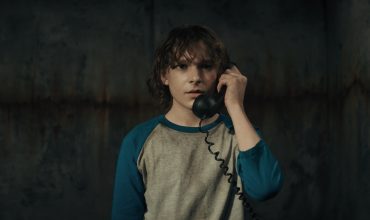Not to be mistaken for that Shyamalan film featuring a very confused Marky Mark, Audrey Diwan’s Happening follows a young woman in 1960s France facing an unwanted pregnancy in her last year of university. Based on the semi-autobiographical novella of the same name (L’Evénement in French) by Annie Ernaux, the film tackles a confronting subject in uncomfortable detail, forcing its audience into the perspective of its protagonist. Happening is not an easy watch, but it’s a strong sophomore feature from Diwan and an essential firsthand look into the trouble that comes from denying women rights to their own bodies.
Anne (Anamaria Vartolomei) studies literature and boards with her besties at the Cité Universitaire, prepping for end-of-year exams and comparing Camus and Sartre on the grounds of their picturesque lodgings. Outside of the lecture hall, the more sexually bold member of the trio, Brigitte, tightens the girls’ bras to attract male attention at university-run dances and shows them how to bring oneself to climax using a pillow. But it’s all for fun as it’s 1963 and Brigitte is a virgin, or a “tease” as her male peers have declared. Little does Brigitte know that one of her supposedly chaste friends spent a month of love-making with an older man last summer break, and the other is pregnant.
Big secrets notwithstanding, these young women are generally open with each other about their hopes for the future. More concerned with passing their exams than actually fraternising with their male peers, it is as shocking for us to hear that Anne is pregnant as it is for Anne, especially since we never see such baby-making behaviour exhibited prior to the revelation. In a pivotal scene earlier in the film, the girls recite their conjugations, starting with present indicative “agire” (meaning “to act/behave/work/proceed”). The pressure to behave as expected is explored as the contradiction that it is – study hard and stay away from men, then give it all up and have a family – and Anne even acknowledges this. “I’d like a child one day, but not instead of a life,” she tells her doctor, clearly in one mind about the choice that is right for her at this very moment. Her clarity (and the staunch lack of options) is the thing that makes her impending doom so frustrating, and as the story is punctuated by each week of her first trimester, we draw closer to the point of no return and the end of her life as she knows it.
Happening frames Anne in a claustrophobic, boxed aspect ratio, for this is not only a personal reel from the film’s author but a recollection of a moment in history in which women’s boundaries were particularly rigid. When Anne’s condition is first “diagnosed”, her doctor apologises for the result, knowing full well the impact it will have on her academic future. He warns her not to speak of her desire for termination as anyone involved would risk imprisonment, but he keeps her secret to spare her society’s wrath towards unwed mothers. Her second doctor (a phone book find prior to the Godsend of Google reviews) sends a “Certificate of Pregnancy” to her dorm and prescribes her with injections that will allegedly help her menstruate; a return trip to the good doctor (after a DIY abortion fails) reveals that they instead strengthened the embryo. The failed-student-of-French in me thought “Saboteur!” while the Australian in me used a word much more fitting of the area to which we (and Anne’s doctor) are exposed.
But Anne’s resolve is stronger still – one of the few things we know about her, as a young woman who lies to her friends about her virginity and whose co-conspirator in this unwelcome happening is not introduced until well into the second half of the film. She is a product of her environment, forced to keep up walls out of fear of judgement (or imprisonment) and she’s right to do so. Even those who would later help her take advantage, like her platonic male friend Jean, who views her pregnancy as a free pass to have sex with her because “there’s no risk” of further conception. Anne doesn’t have time to be insulted by Jean’s repulsiveness; she’s bounding towards week 12 and needs his help in securing a contact for an expensive underground practitioner who can hopefully rectify that which she was unable.
There should probably be a giant trigger warning before this film for those uninitiated in onscreen abortions as there are three attempts in total (one of them, thankfully, implied). But I have to respect the furious intentions of Ernaux and director Diwan, to whom the story is “very important” (speculation ensues). To grade the severity of the worst of the procedures would put it somewhere behind Nymphomaniac: Part II and hovering slightly above Titane; leave it to the French to conceive a more dire with-childness than last year’s gender fluid murderess harbouring an automaton in her womb. Happening strangely contains more horror than its aforementioned dark sister but is frighteningly grounded in reality and this is reflected in the near-POV perspective Diwan chooses for the film’s hardest scene. Those whose immunity has strengthened from exposure to Lars von Trier should be fine but regular cinema-goers may feel some phantom discomfort between their legs and a closing in of peripheral vision.
Despite the pain of this chapter of Anne’s story, there is a sense of sorority in the necessary bonds formed between women in strife and women willing to risk everything to help them. I was reminded of one of the more powerful episodes of Penny Dreadful featuring the wonderful Patti LuPone as The Cut-Wife of Ballentree Moor. Branded a witch (and not even because she actually is one), The Cut-Wife offers a service to women-in-a-pickle in the late 1800s, whose impregnators then ungratefully burn her for ridding them of more bastard children. No good deed goes unpunished when unenlightened men have a say; perhaps it’s why the termination in the oestrogenic Portrait of a Lady on Fire is comparatively so pleasant (and coincidentally, performed on a character played by Luàna Bajrami – appearing here as the third member of the trio, Hélène).
With each week drawing to a close (and each failed attempt at ending her pregnancy), Anne will either be left with a newfound enthusiasm towards study or a very, very strong baby. What I can say unequivocally is that Victor Hugo’s description of “holy rags”, for me at least, rings painfully true. 8/10.
Happening is out Thursday April 14.


